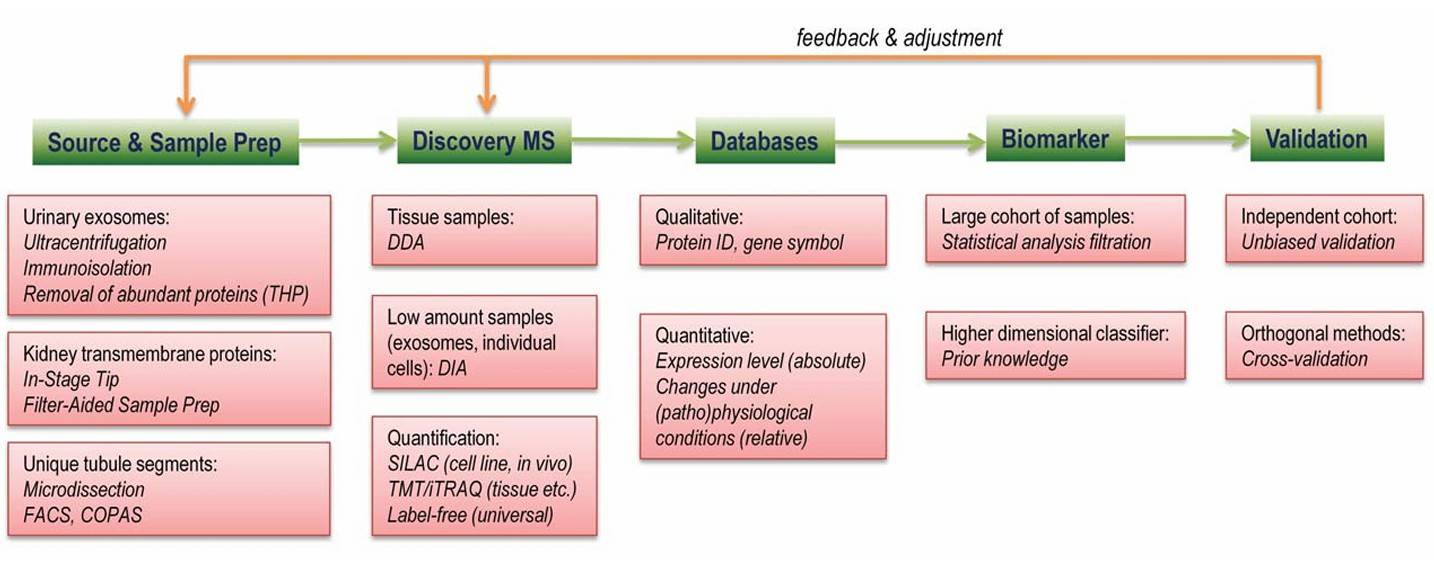As a dedicated research service provider, we specialize in offering excellent diagnostics development services in the field of rare kidney diseases. In this specialized area, the development of accurate and reliable diagnostic tests is essential to advancing prevention strategies and therapeutic innovations.
Overview of Rare Kidney Diseases Diagnostics Development
Rare kidney diseases are complex and diverse, often challenging early detection and classification due to their low prevalence. Advances in molecular biology and genomics enable the identification of biomarkers and genetic mutations, paving the way for precise diagnostic tools. Integrating bioinformatics and novel imaging techniques enhances diagnostic accuracy, crucial for informed treatment strategies.
 Fig.1 General workflow in kidney disease proteomic biomarker discovery research. Fenton, R. A., 2018)
Fig.1 General workflow in kidney disease proteomic biomarker discovery research. Fenton, R. A., 2018)
Technologies for Kidney Disease Diagnostics Development
- Digital Pathology: Whole slide imaging and digitization are revolutionizing pathology by enabling cloud-based image sharing and analysis, significantly advancing automated segmentation and feature extraction for structures like glomeruli, tubules, and the interstitium.
- Single Cell/Single Nuclear RNA Sequencing (Sc/snRNAseq): Driven by microfluidics, this technology allows detailed gene expression analysis at the cellular level, identifying molecularly defined cell populations and novel cell states induced by disease.
- Large Scale 3D Imaging and Tissue Cytometry: This technology combines label-free and 3D imaging to analyze and classify a large number of cells in kidney sections, resulting in large datasets that provide high-confidence findings.
- Spatial Transcriptomics: Provides whole transcriptome mRNA expression with spatial localization, correlating molecular expression with renal pathology.
- Regional Transcriptomics and Proteomics: Uses laser microdissection to perform region-specific transcriptomic and proteomic analysis, helping to uncover signatures in health and disease.
- Metabolomics and Epigenetic Interrogation Methods: Involves the analysis of metabolites and epigenetic markers to explore molecular compositions within the kidney, advancing understanding and research into disease mechanisms.
Genetic Diagnostics Development for Rare Kidney Diseases
Genetic testing technologies continue to evolve, providing increasingly sophisticated tools for diagnosing kidney and other genetic diseases, while also presenting challenges in data interpretation and incidental findings.
Table 1. Genetic testing options. (Prakash, S., and A. G. Gharavi., 2015)
| Test type |
Test description |
Indications |
| Sanger sequencing |
Single nucleotide resolution of desired segment. Usually limited 1KB |
Detection of a known mutation
Confirmatory testing for NGS
Filling gaps not covered by NGS |
| Chromosomal arrays |
Chromosomal gains and losses (CNVs) |
Syndromic cases that exhibit multiorgan phenotypes
Neuropsychiatric disorders or developmental delay |
| NGS gene panels |
Single nucleotide resolution of different genes indicated for the particular disorder |
First line of testing for a patient with a particular set of symptoms |
| WES |
Single nucleotide resolution of exonic regions of the genome |
Undiagnosed cases |
| WGS |
Single nucleotide resolution of whole genome |
Undiagnosed cases |
Disclaimer: Protheragen focuses on providing preclinical research services. This table is for information exchange purposes only. This table is not a treatment plan recommendation. For guidance on treatment options, please visit a regular hospital.
Our Services
At our company, we take pride in providing a comprehensive suite of services to advance diagnostics development for rare kidney diseases. Our team of expert scientists and dermatologists utilizes state-of-the-art technologies and profound expertise to propel your diagnostic projects forward, ensuring precision and innovation at every stage of development.
Biomarker Discovery and Development
We provide cutting-edge genomics and proteomics solutions to identify and validate novel biomarkers. Our services accelerate drug development and enable personalized treatment strategies, transforming outcomes for rare kidney diseases.
Diagnostic Kit Development
We specialize in development diagnostic kits tailored for rare kidney diseases. Our approach covers every stage from design to development, delivering precise and reliable tools that enhance diagnostic capabilities in the field of nephrology.
Workflow of Diagnostics Development
Our service workflow in diagnostics development encompasses a sequential, four-step process focused on preclinical services, covering biomarker discovery, assay validation, prototype development, and culminating in diagnostic kit refinement, excluding clinical trials and regulatory approvals.

Biomarker Discovery

Assay Development

Prototype Development

Preclinical Validation
Types of Rare Kidney Diseases
We specialize in diagnostics development for a wide range of rare kidney diseases, encompassing genetic, autoimmune, and metabolic disorders. Our expertise and advanced technologies enable accurate detection and comprehensive insights, paving the way for effective management and personalized treatment strategies.
At our company, we are dedicated to offering extensive, one-stop preclinical development services, encompassing everything from disease model development to innovative therapy research. If you are interested in our services, please don't hesitate to
contact us.
References
- Fenton, R. A. "Proteomic Approaches in Kidney Disease Biomarker Discovery." Am J Physiol Renal Physiol 315.6 (2018): F1817-F21.
- Prakash, S., and A. G. Gharavi. "Diagnosing Kidney Disease in the Genetic Era." Curr Opin Nephrol Hypertens 24.4 (2015): 380-7.
All of our services and products are intended for preclinical research use
only and cannot be used to diagnose, treat or manage patients.


 Fig.1 General workflow in kidney disease proteomic biomarker discovery research. Fenton, R. A., 2018)
Fig.1 General workflow in kidney disease proteomic biomarker discovery research. Fenton, R. A., 2018)






